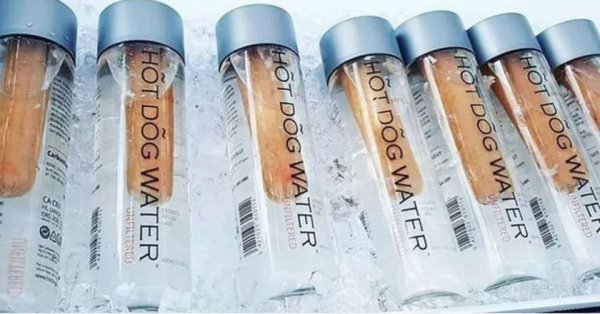
Every summer, the beautiful coastal city of Vancouver, Canada hosts a “Car Free Day” Festival. On this day, neighborhoods close their streets to vehicles, so artists and local businesses can showcase and sell their wares to the thousands of fairgoers that flock to the event. At this year’s festival on June 17, 2018, visitors seeking something unique and healthy were in for a special treat – unfiltered hot dog water!
Priced at a steep CAD 38 ($30 US), the sleek glass container featured a single beef hot dog suspended in the water it had been boiled in. Beside the water bottles was a giant poster touting the purported benefits of the drink. The bold red lettering stated the “Keto friendly” (a popular diet that shuns carbohydrates in favor of fat and protein) water would help the consumer “lose weight, increase brain function, look younger, [and] increase vitality.” The heading was followed by additional health benefit claims as well as customer testimonials.
The most critical information, however, was in the fine print on both the poster and the Hot Dog Water bottle. It read, “’Hot Dog Water,’ in its absurdity, hopes to encourage critical thinking related to product marketing and the significant role it can play in our purchasing choices."

Douglas Bevan, “CEO of Hot Dog Water,” said while some people saw through the joke right away, many took the health claims at face value and did not hesitate to spend the exorbitant amount of money on a bottle of water with a soggy hot dog. By the end of the day, he managed to sell over 60 liters, or just under 6 gallons, of the so-called healthy water.
An artist and tour operator by trade, Bevan later said the reason he spent $1200 of his own funds to stage the outlandish stunt was to show the world how easy it is to fool innocent consumers. “It’s really sort of a commentary on product marketing and especially sort of health-quackery product marketing,” Bevan told Global News.
This isn’t the first time the public has fallen for a seemingly obvious hoax – and probably will not be the last. However, it is a good reminder to use your common sense and not be taken in by fancy packaging or clever marketing when making purchasing decisions. If something sounds too good to be true, chances are it is!
Resources: thedieline.com, Globalnews.ca, sfgate.com
